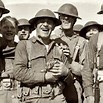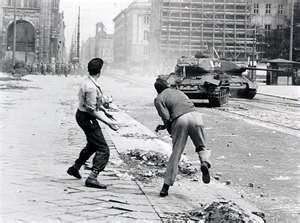
Remember Gorbachev?
I was reading an article about Gorbachev the other day. Gorbachev, remember him? I’m embarrassed to say that until I read this article, I had forgotten about him a little, thinking that he must have passed away by now. But this isn’t the case apparently. He’s 82 and still living in Moscow. He’s been a widower for some years now. His wife Raisa died of leukemia in 1999. He has one daughter, two granddaughters and a great-granddaughter. His health is poor.
He was in the news again because he was criticizing the Putin government. This is nothing new, he has done this many times before. This time, in an interview with the BBC, he called the Putin inner circle a ring of “thieves and corrupt officials.” He criticized the attacks on political freedom that the new and ever more draconian Russian laws against civil protest represent. Nothing that any of us wouldn’t agree with, right? Gorbachev always had a way about him, saying what we in the West like to hear, espousing what we hold as self-evident truths.
I should say I certainly do remember Gorbachev. I remember being at school in England when he came to power in 1985. I remember him as a breath of fresh air in the dying days of the Cold War. He held out hope, with his Perestroika, of there finally being, after 40 years of painful and unnatural distance, some closing of the East-West divide.
I remember how in the middle and late eighties, he was a superstar the world over. University students from Berlin to Tokyo wore T-shirts of the plump Russian man with the port-wine stain on his balding head. I remember a well-to-do West German matron in the Dusseldorf suburb I was living in a few years later having a Yorkie called, “Gorbachev.”
“But we call him Gorbi,” she confided to me as we passed each other on the red brick sidewalk, me out for my daily run, her proudly walking her little bundle of hope.
As it turned out, that West German matron was right to place her trust and pin her hopes on the man who was to be the last General Secretary of the Communist Party of the Soviet Union. For two years later, in 1989, when the East German regime began to crumble, no Soviet tanks rumbled through the streets of East Berlin as they had rumbled through the streets of Prague in 1968 or Budapest in 1956. Gorbachev kept the Russian troops in their barracks. He let East Germany go. And as went East Germany, so went the rest of the Eastern Block. The Iron Curtain, long corroded, fell to the ground in a matter of days and promptly burst into dust. Gorbachev had done this, as far as the Europeans were concerned, he had allowed it to happen. Gorbachev, not the American president who had outspent him, was the hero. Gorbachev had seen the writing on the wall and acted upon its message.
So it was with some surprise when I went to Russia nine years later and found that the Russians didn’t feel about Gorbachev at all as we did in the West. In fact, when you brought his name up, people tended to wrinkle their noses as if a bad smell had suddenly crept under the door and invaded the room.
“But surely things are better here now?” I would ask.
“Yeeees,” the answer usually came slowly, there were things that were better, but they were far outnumbered by the things that had gotten worse.
For Gorbachev, in the minds of the Russians, was associated not with any new political freedoms they might have been given, but simply with the time when things fell totally and completely apart. As a result of Gorbachev’s policies, all the old certainties, even if they had been painful or stifling, were swept away, and though initially people might have been pleased about this, they now found that they were surrounded only by uncertainties and it was a situation they did not understand and were ill-prepared to deal with.
Yes, there was everything available in the markets now, but if you didn’t get paid regularly, what was the use of that? Pensioners who had been taken care of in the Old Soviet Union were out begging on the streets. The parks, which the Young Pioneers used to keep clean, had become tattered and strewn with rubbish. The Soviet Union, which used to be a strong country, had been reduced to the basket case of a former great power, a laughing stock, a country flooded with foreigners, like myself, who had come to show the pathetic Russians how to do things in the western way.
There was a lot of nostalgia in 1998 for the way things used to be, for when people had jobs and the price of bread didn’t change and the West pretty much left Russia alone. Ironically, you ran into some of this same nostalgia in Eastern Europe, in the countries in which you would have supposed no one would be nostalgic for the old Soviet-dominated Europe.
Patricia Hampl, an American memoirist from Minneapolis, describes in her book, A Romantic Education, the Prague that she experienced in the mid-seventies when searching for her family roots and the one that she visits now each summer to teach writing. The main observation she made was that the Old Prague, the pre-Gorbachev one that is, was much, much quieter. You could wander the intricate medieval lanes of the city or quaff a beer wrapped in your own thoughts and didn’t have to get up at 5 in the morning to see the Charles Bridge free of tourists. A young woman I know from the city of Dresden told me that in much the same way she doesn’t like what had been done to the Newmarket Square in the center of the Saxon capital. Yes, the city fathers had poured a lot of money into it and it was shiny and cosmopolitan now, full of cafes and shops and tourists, but it was not the quiet, dignified old world square that she remembered from her childhood, the one that she and her family and the other local people had had to themselves. For the fall of the Wall had brought them what they had up to then been spared: the rat-race.
So Gorbachev’s legacy is complicated. We love him in the West, but in Russia, in a recent poll, when people were asked under which ruler their country had experienced the most positive development, Gorbachev came last, even after Joseph Stalin! And in Eastern Europe, in the countries which certainly benefited most from the break-up of the Soviet Union, people are not necessarily anti-Gorbachev, but neither are they perfectly happy with the new world he gave them. They were demonstrating in Berlin the other day, demonstrating against a city plan to tear down one of the last standing sections of the Berlin Wall in order to put in some expensive new apartment blocks. They didn’t want to lose a reminder of what had certainly been a painful, but perhaps a more thoughtful and quieter past.
“Give us our wall back!” they used to chant in Berlin in the years just after the Re-unification of East and West Germany. It seemed a crazy idea to outsiders at the time, but it wasn’t as crazy as all that either. It was just another example of the ancient human yearning for the past, for what people always idolize as a simpler time, in this case the time before Gorbachev, when the streets of the East were gray and a little boring but when people had time to sit and talk with their families and friends for hours. No one was rushing off anywhere, since no one had anywhere to go.





As a Latvian Immigrant, raised to speak Latvian and know all about Latvia…I think the opinion on whether to love or loathe Gorbachev depends on the nationality of the one asked…I think ALL Latvian ethnic people, no matter their age, would say only good things about him and love the fact that the Baltic Republics were again free and independent in 1991 after 50+ years of occupations by Soviets and Germans and Soviets again….If you ask any non-Latvians living or born in the Baltic sate – they are not so please because Russian is no longer the language of the countries and they are looked upon as decendants of conquerers and the non-Latvians do not come from any history of capitalism or democracy – wheras the Latvians, Estonians and Lithuanians had the 1918-1940 period to learn about those institutions…and all those ruling and creating the new Nations are the children and grand children of folks who remember…
Remember, that most Soviet citizens, including those living in the various 13 other “so-called” “Republics” had no living inhabitants who knew capitalism or democracy, so of course they would think it strange and difficult to deal with…
I take your point about Latvia and the other Baltic countries being quite happy to be rid of the Soviet yoke, but I cannot agree about the experience of capitalism being the reason for whether or not a country was nostalgic for the Soviet period. The two countries I mentioned, the former East Germany and Czechoslovakia had certainly had an experience of capitalism as well, yet the nostalgia was real, not nostalgia for the Russians, but for the old days of closer families and less rush. Perhaps the difference lies in the way the different countries were treated post-1945. The three Baltic countries had allied themselves with Germany against the Soviets during WWII and were therefore treated more harshly afterwards with a concerted effort to settle ethnic Russians there and change the ethnic balance in these countries. The same did not happen in East Germany or Czechoslovakia.
And the Germans I was talking about who were crying “Give us our Wall back!” after it fell were actually former West Germans who missed the special status they had had back in the days of their great isolation.
The 3 Baltic Republics had NOT “allied” themselves with Germany during WWII…they were “Occupied” by the Nazis when Hitler reneged on his treaty with the Soviets to divide Eastern Eurpe and initially “give” the Baltics and 1/3 of Poland to the Soviet Union…then a year later he decided to conquer/beat the Soviet Union. In order to do so, had to go through the Baltics and occupy those for almost 4 years…Tho the Baltic peoples were more comfortable in dealing with the slightly nicer German occupiers than the terrible Russian/Soviet occupiers, they were still occupied and no one likes that! And of course, their Jewish inhabitants disappeared….
Of course the East Germans and Czechs in the 90’s had parents and grandparents who recalled the period before the war..but remember, the Germans didn’t have that much democracy memories as those died 1933.. Capitalism IS what creates work/businesses/salaries etc…ALL of that had been handled by the state and NOW was in newly created private enterprise(read Capitalism) hands – that is what I mean when I say they had no experience about that…. or democracy – voting/candidates/elections etc.